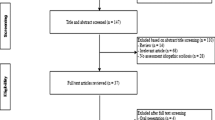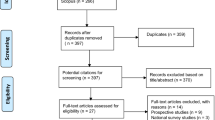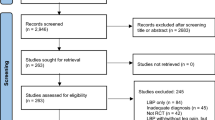Abstract
Purpose
To perform a cross-cultural adaptation and validation of Saudi Arabic (SA) version of SRS-30 and test it on Saudi patients with adolescent idiopathic scoliosis (AIS).
Methods
A retrospective analysis of prospective collected data of 322 patients with AIS. The cross-cultural adaptation process was performed using the American Association of Orthopedic Surgeons (AAOS) Outcomes Committee method. A pre-test analysis was conducted on 30 patients. All patients had completed the SRS-22r and SF-12 preoperatively and 198 patients had completed the SA version of SRS-30 and SF-12 postoperatively twice at six weeks interval. The validity and internal consistency were tested using the interclass correlation coefficient (ICC), Cronbach alpha, person correlation coefficient, and confidence interval (CI).
Results
There are 288 (89.4%) girls and 34 (10.6%) boys and the average age is 15 ± 2.3 years (range from 10–21 years). The majority of patients have a Lenke type 1 curve (41%) and only 14% have a Lenke type 5 and 6. The overall Cronbach alpha (CA) of all SRS-30 domains is 0.87. However, the Cronbach alpha for the satisfaction, and function domains slightly lower than the original English questionnaire.
Conclusion
The Saudi Arabic version of SRS-30 is a reliable and valid instrument and can be applied to evaluate the quality of life in patients with AIS.

Similar content being viewed by others
Data availability statement
The datasets used and/or analysed during the current study are available from the corresponding author on reasonable request.
References
Haher TR, Gorup JM, Shin TM et al (1999) Results of the scoliosis research society instrument for evaluation of surgical outcome in adolescent idiopathic scoliosis: a multicenter study of 244 patients. Spine 24(14):1435. https://doi.org/10.1097/00007632-199907150-00008
Han J, Xu Q, Yang Y, Yao Z, Zhang C (2015) Evaluation of quality of life and risk factors affecting quality of life in adolescent idiopathic scoliosis. Intractable Rare Dis Res 4(1):12–16. https://doi.org/10.5582/irdr.2014.01032
Sanders JO, Carreon LY, Sucato DJ, Sturm PF, Diab M, Spinal Deformity Study Group (2010) Preoperative and perioperative factors effect on adolescent idiopathic scoliosis surgical outcomes. Spine 35(20):1867–1871. https://doi.org/10.1097/BRS.0b013e3181efa6f5
Carreon LY, Sanders JO, Diab M, Sturm PF, Sucato DJ, Spinal Deformity Study Group (2011) Patient satisfaction after surgical correction of adolescent idiopathic scoliosis. Spine 36(12):965–968. https://doi.org/10.1097/BRS.0b013e3181e92b1d
Ghandehari H, Mahabadi MA, Mahdavi SM, Shahsavaripour A, Seyed Tari HV, Safdari F (2015) Evaluation of patient outcome and satisfaction after surgical treatment of adolescent idiopathic scoliosis using scoliosis research society-30. Arch Bone Jt Surg 3(2):109–113
Guillemin F, Bombardier C, Beaton D (1993) Cross-cultural adaptation of health-related quality of life measures: literature review and proposed guidelines. J Clin Epidemiol 46(12):1417–1432. https://doi.org/10.1016/0895-4356(93)90142-N
Beaton DE, Bombardier C, Guillemin F, Ferraz MB (2000) Guidelines for the process of cross-cultural adaptation of self-report measures. Spine 25(24):3186–3191. https://doi.org/10.1097/00007632-200012150-00014
Moser CA, Kalton G (1989) Survey methods in social investigation. Gower, Aldershot
Huck SW (2007) Reading statistics and research. Allyn & Bacon, United States of America
Ghauri P, Gronhaug K (2005) Research Methods in Business Studies. FT/Prentice Hall, Harlow
Rodrigues LMR, Gotfryd AO, Machado AN, Defino M, Asano LYJ (2017) Adolescent idiopathic scoliosis: surgical treatment and quality of life. Acta Ortop Bras 25(3):85–89. https://doi.org/10.1590/1413-785220172503157788
Pellegrino LN, Avanzi O (2014) Prospective evaluation of quality of life in adolescent idiopathic scoliosis before and after surgery. J Spinal Disord Tech 27(8):409–414. https://doi.org/10.1097/BSD.0b013e3182797a5e
Haidar RK, Kassak K, Masrouha K, Ibrahim K, Mhaidli H (2015) Reliability and validity of an adapted Arabic version of the scoliosis research society-22r questionnaire. Spine 40(17):E971–E977. https://doi.org/10.1097/BRS.0000000000000956
Haddad C, Sacre H, Obeid S, Salameh P, Hallit S (2021) Validation of the Arabic version of the “12-item short-form health survey” (SF-12) in a sample of Lebanese adults. Arch Public Health 79(1):56. https://doi.org/10.1186/s13690-021-00579-3
Asher MA, Lai SM, Glattes RC, Burton DC, Alanay A, Bago J (2006) Refinement of the SRS-22 health-related quality of life questionnaire function domain. Spine 31(5):593–597. https://doi.org/10.1097/01.brs.0000201331.50597.ea
Glattes RC, Burton DC, Lai SM, Frasier E, Asher MA (2007) The reliability and concurrent validity of the scoliosis research society-22r patient questionnaire compared with the child health questionnaire-cf87 patient questionnaire for adolescent spinal deformity. Spine 32(16):1778–1784. https://doi.org/10.1097/BRS.0b013e3180dc9bb2
Ware JE, Kosinski M, Keller SD (1996) A 12-item short-form health survey: construction of scales and preliminary tests of reliability and validity. Med Care 34(3):220–233. https://doi.org/10.1097/00005650-199603000-00003
Gandek B, Ware JE, Aaronson NK et al (1998) Cross-validation of item selection and scoring for the SF-12 health survey in nine countries. J Clin Epidemiol 51(11):1171–1178. https://doi.org/10.1016/S0895-4356(98)00109-7
Jenkinson C, Layte R, Jenkinson D et al (1997) A shorter form health survey: can the SF-12 replicate results from the SF-36 in longitudinal studies? J Public Health 19(2):179–186. https://doi.org/10.1093/oxfordjournals.pubmed.a024606
Ware JE, Keller SD, Kosinski M (1995) How to score the SF-12 physical and mental health summary scales. Health Institute, New England Medical Center, Boston
Kyrölä K, Järvenpää S, Ylinen J, Mecklin JP, Repo JP, Häkkinen A (2017) Reliability and validity study of the Finnish adaptation of scoliosis research society questionnaire version SRS-30. Spine 42(12):943–949. https://doi.org/10.1097/BRS.0000000000001938
Carriço G, Meves R, Avanzi O (2012) Cross-cultural adaptation and validity of an adapted Brazilian Portuguese version of scoliosis research society–30 questionnaire. Spine 37(1):60–63. https://doi.org/10.1097/BRS.0b013e31823c7cd6
Ghandhari H, Ameri E, Mahmoudi A, Nikouei F, Sabbaghan S (2021) Validity and reliability of an adapted Persian version of the scoliosis research society-30 questionnaire. Arch Bone Jt Surg. https://doi.org/10.22038/abjs.2021.47205.2305
Alanay A, Cil A, Berk H et al (2005) Reliability and validity of adapted Turkish version of scoliosis research society-22 (SRS-22) questionnaire. Spine 30:2464–2468
Climent JM, Bago J, Ey A et al (2005) Validity of the Spanish version of the scoliosis research society-22 (SRS-22) patient questionnaire. Spine 30:705–709
Cheung KM, Senkoylu A, Alanay A et al (2007) Reliability and concurrent validity of the adapted Chinese version of scoliosis research society-22 (SRS-22) questionnaire. Spine 32:1141–1145
Acknowledgements
I Acknowledged all persons who help in forward and backward translation of the questionnaire. Also, I would like to acknowledge Dr Fadi Ali for his thorough external review of the translated questionnaire.
Funding
No fund was received to conduct this study.
Author information
Authors and Affiliations
Contributions
Conceptualization: AA Data collection: AA Formal analysis: AA Writing-original draft preparation: AA Approval of final version of manuscript: AA Agreement to be accountable for all aspects of the work: AA.
Corresponding author
Ethics declarations
Conflict of interests
No potential conflict of interest relevant to this article was reported.
Informed consent
Patients accepted and signed the consent form approved by institutional review board.
Additional information
Publisher's Note
Springer Nature remains neutral with regard to jurisdictional claims in published maps and institutional affiliations.
Supplementary Information
Below is the link to the electronic supplementary material.
Rights and permissions
Springer Nature or its licensor (e.g. a society or other partner) holds exclusive rights to this article under a publishing agreement with the author(s) or other rightsholder(s); author self-archiving of the accepted manuscript version of this article is solely governed by the terms of such publishing agreement and applicable law.
About this article
Cite this article
Alzakri, A. Reliability and validity of an adapted Saudi Arabic version of scoliosis research society outcomes questionnaire (SRS-30) in Saudi Arabia. Spine Deform 11, 281–287 (2023). https://doi.org/10.1007/s43390-022-00625-2
Received:
Accepted:
Published:
Issue Date:
DOI: https://doi.org/10.1007/s43390-022-00625-2




